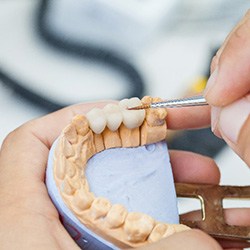Dental Bridges – McKinney, TX
A Tried-and-True Tooth-Replacement Solution

If you’re missing one tooth or several teeth in a row, you know the significant impact tooth loss can have on your confidence, bite, speech, and overall quality of life. Fortunately, there is a lifelike and durable solution: dental bridges. With this tried-and-true tooth-replacement solution, our McKinney dentists can improve the look and function of your smile for years to come. Want to find out if you’re a candidate for this restorative dental service? Then schedule a consultation with us or keep reading to learn more!
Why Choose OakBrook Dental and Orthodontics for Dental Bridges?
- Top-Rated and Conveniently Located
- Multiple Financial Solutions Available
- Evening and Saturday Hours

What is a Dental Bridge?
While a dental crown can restore a significantly damaged or decayed tooth, a dental bridge replaces those teeth that have gone missing altogether. It can take the place of one, two, or several consecutively missing teeth.
A dental bridge works by forming a literal bridge over the gap in your smile. A crown is placed on each of the two natural teeth surrounding the empty space. These stabilize the prosthetic teeth that fill in the gap between. Most dental bridges are made out of porcelain-fused-to-metal. All-ceramic bridges are also available.

Types of Dental Bridges
At OakBrook Dental and Orthodontics, our team offers two types of dental bridges: traditional bridges and implant bridges. During your consultation, we will review each of these options in depth to determine which one is best for you. In the meantime, however, here is a little more information about each:
Traditional Dental Bridge
As mentioned above, traditional bridges require a dental crown to be placed on either side of the gap to secure the prosthetic tooth (or teeth) in place. Although this can require your natural, healthy teeth to be altered, you can have peace of mind knowing the results will be flawless. That’s because every part of the bridge is custom-made using durable and lifelike materials.
Implant Bridge
Conversely, implant bridges utilize dental implants on each side of the gap. Although this may require a higher investment, your healthy teeth don’t need to be altered in any way and the results can last for decades at a time. Plus, since the implants are inserted directly into your jawbone, there is added stability and your jawbone will have the stimulation it needs to stay strong!

The Benefits of Getting a Dental Bridge
Year after year, decade after decade, dental bridges remain a popular tooth-replacement solution. There’s good reason for it too! To begin, a dental bridge restores a patient’s ability to eat, speak, and smile with confidence. Furthermore, it prevents the surrounding teeth from drifting out of place. Of course, there are several other perks of this restorative solution, including the fact that it’s easy to care for, can last for years to come with proper care, and delivers extremely lifelike results.
Dental Bridges FAQs
Dental bridges are restorations that help replace several teeth in one prosthetic. They were designed to stay in place for many years with proper care, so you don’t need to worry about removing them to clean your teeth. Plus, because they are securely attached to your existing teeth, you can use them to enjoy a variety of nutritious foods you may have had to avoid in the past due to missing teeth.
Can You Take a Dental Bridge Out?
No, you cannot remove your dental bridge yourself, as it was designed remain in your mouth for many years. If you do need to remove your bridge to get dental implants or due to a cavity on an anchor tooth, your dentist can remove your bridge for you. Please note that partial dentures are not “removable bridges.” A true bridge will not come out like a partial denture.
How Long Should a Dental Bridge Last?
Dental bridges last between five and fifteen years with proper care and depending on the material your dentist uses. At Oakbrook Dental & Orthodontics, we use porcelain fused to metal for a natural looking prosthetic that is as durable as it is beautiful.
The longevity of your bridges is mostly dependent on your lifestyle; however, factors such as your diet, oral hygiene, and your habits will all affect its lifespan. Never use your bridge to chew anything but food and avoid using it to crunch anything too hard like hard candies or ice cubes. Don’t smoke and be sure to maintain your oral health by regularly brushing your teeth (twice a day) and flossing once a day. Also, be sure to attend your regular, semi-annual dental exams and cleanings.
It is also important to note that because the front teeth are not used to chew, a front bridge may last a bit longer than a back bridge, and bridges that are secured to dental implants will likely last longer than those attached to natural teeth.
How Many Teeth Can a Dental Bridge Replace?
A dental bridge can replace anywhere from one to four teeth in a row, however, most only replace one or two. This is because the longer your bridge extends, the less stable it becomes, especially if the teeth it is anchored to are not in good condition.
Some patients may have better results with implant bridges, as dental implants can be much stronger and more secure than natural teeth.
Can Dental Bridges Get Cavities?
No, the crowns on your dental bridges cannot get cavities, however the teeth they are anchored to can. This can happen if food debris gets caught underneath the pontics or in the place where your crowns meet your gums. This is more likely to occur if you have poor oral hygiene, so be sure to brush and floss your teeth as well as around your bridge every day.
It is also important to note that if your bridge is nearing the end of its lifespan, the cement that bonds it to your permanent teeth may start to crack. When this happens, bacteria can enter the cement and travel to the underlying tooth, causing cavities and infection. Thus, don’t skip your regularly scheduled dental exams so your McKinney dentist can prevent this before it has a chance to occur.

